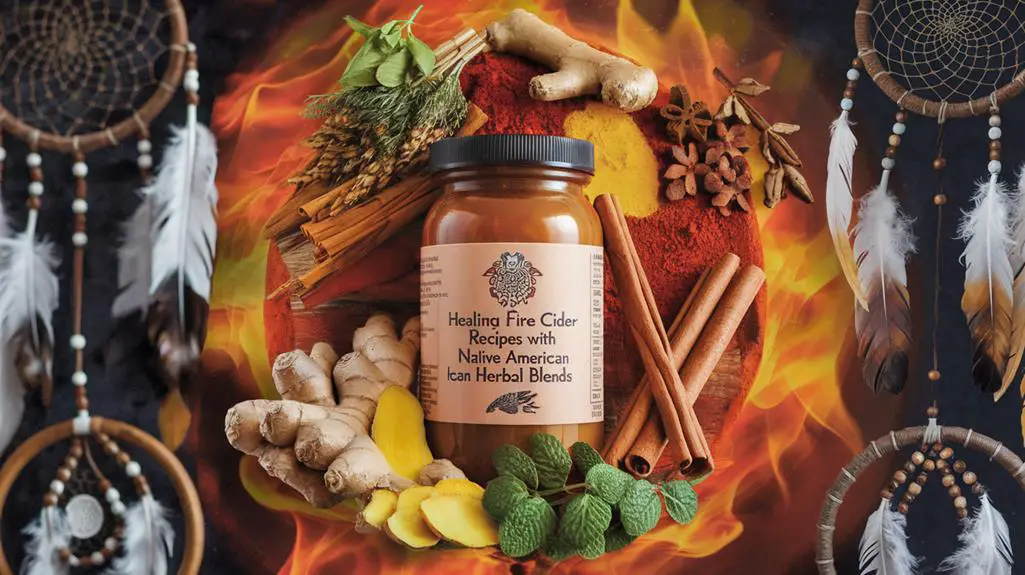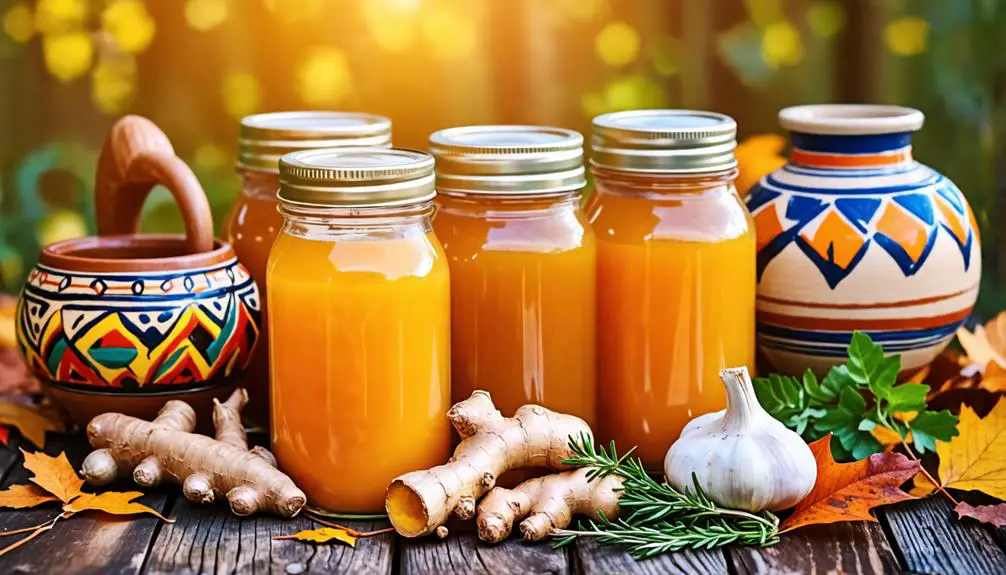In exploring healing fire cider recipes enriched with Native American herbal blends, one uncovers a unique intersection of tradition and health. By incorporating herbs like echinacea, yarrow, and sage, these recipes not only enhance the drink's therapeutic properties but also pay homage to the cultural significance of each ingredient. The addition of juniper berries and sweetgrass introduces both detoxifying effects and deeper flavors, inviting a deeper appreciation for these age-old practices. As one considers how these elements come together, questions arise about the potential health impacts and culinary applications of these herbal blends.
Need cookware for your meal? Toolbox, a Pear to Pear rental marketplace, might be worth a look.
Quick Takeaways
- Combine traditional fire cider ingredients with echinacea for enhanced immune support and illness prevention.
- Add yarrow to fire cider for its anti-inflammatory properties and holistic health benefits.
- Incorporate sage to deepen cultural connections and amplify the health benefits of the tonic.
- Use juniper berries for detoxification and promoting urinary health in your fire cider recipe.
- Sweetgrass can be included for its aromatic depth and cultural significance, enriching your fire cider blend.
Understanding Fire Cider
Fire cider, with its roots deeply embedded in traditional herbal remedies, is a powerful medicinal tonic known for its immune-boosting properties. This invigorating elixir combines apple cider vinegar with a variety of warming ingredients, including garlic, onion, ginger, and horseradish.
Its preparation involves layering these chopped herbs in a quart-sized jar, covering them with apple cider vinegar, and letting the mixture steep in a cool, dark place for a month, shaking it daily to enhance the infusion process.
After steeping, the herbal community recommends straining the mixture through cheesecloth, allowing the vibrant liquid to separate from the solid pulp. Many add honey to sweeten their concoction, tailoring it to their taste preferences.
Fire cider's health benefits extend beyond immune support; it aids digestion and provides warmth, making it particularly beneficial during colder months.
Exploring variations of fire cider opens the door to creativity, with options to include turmeric, citrus peels, and unique ingredients like schisandra berries.
This flexibility not only enhances flavor profiles but also allows individuals to craft their own personal Fire Cider Recipe, promoting well-being through a cherished tradition.
Native American Herbal Blends
Herbal remedies have long been celebrated across cultures, and Native American traditions stand out for their profound understanding of local flora and its healing properties. These herbal blends reflect a deep knowledge of the land, utilizing seasonal plants that promote health and harmony within the body and spirit.
- Echinacea: Renowned for its immune support, this powerful herb bolsters the body against illness.
- Sage: Used for cleansing and protection, sage embodies the spiritual connection Native Americans have with nature.
- Yarrow: Celebrated for wound healing, yarrow showcases a holistic approach to addressing physical ailments.
Many Native American tribes possess unique recipes and traditions surrounding herbal remedies, often passed down through generations. This rich heritage emphasizes the importance of balance and harmony in one's health journey.
Other plants, like willow bark for pain relief, additionally demonstrate this thorough approach. Moreover, these herbal blends frequently intertwine with rituals and ceremonies, reinforcing the spiritual ties to nature.
Healing Recipe Variations

How can one elevate the traditional fire cider experience? By incorporating healing recipe variations that honor Native American herbal blends, one can create a potently beneficial tonic. Echinacea, cherished for its immune support, can be added to enhance the cider's protective qualities.
Alongside this, yarrow introduces anti-inflammatory benefits, making the mixture even more dynamic. Juniper berries also shine as a detoxifying ingredient, lending a unique flavor profile while promoting urinary health.
Adding sage not only deepens the connection to cultural practices but also amplifies the overall health benefits of the fire cider. Utilizing wildcrafted herbs like plantain enriches the recipe with soothing properties tailored to specific ailments, ensuring each batch is both medicinal and effective.
For a touch of sweetness, sweetgrass can be introduced, its aromatic nature adding depth and cultural significance to the concoction. These variations create a fire cider that's not just a drink but a celebration of healing through herbs, connecting one to the wisdom of the past while serving others in the present.
Each ingredient contributes to a balanced, restorative elixir that honors traditional practices.
Health Benefits of Ingredients
Throughout history, various ingredients in fire cider have been celebrated for their remarkable health benefits. This potent concoction, rich in tradition, not only warms the soul but also supports overall wellness.
- Garlic and onion: Known for their broad-spectrum antimicrobial properties, they help combat infections and bolster immune function, particularly during cold and flu season.
- Ginger: This zesty root enhances circulation and aids digestion, promoting overall gastrointestinal health and comfort.
- Horseradish: Recognized for its ability to clear sinuses, it alleviates respiratory issues, providing relief during times of congestion.
Additionally, cayenne pepper boosts metabolism and enhances immune response, potentially reducing the duration and severity of colds.
The star ingredient, apple cider vinegar, serves as a base for fire cider, promoting digestive health by balancing pH levels and nurturing beneficial gut bacteria.
In essence, each ingredient in fire cider contributes to a holistic approach to health, making it a cherished remedy for those looking to serve others with nature's gifts.
Culinary Uses and Tips

Fire cider isn't just a remedy for wellness; it's also a versatile ingredient that can elevate culinary creations. Those looking to make fire cider will find it easy to incorporate into various dishes.
For instance, mixing equal parts of fire cider and olive oil creates a tangy salad dressing that enhances greens with its spicy notes.
In marinades for meats, tofu, or tempeh, fire cider infuses a zesty kick while tenderizing proteins, making meals more delightful. Additionally, it serves as an excellent base for soups and stews, enriching them with depth and boosting their immune-supportive properties.
For a soothing beverage, simply dilute fire cider with warm water and honey; this comforting drink is especially welcome during cold and flu season.
To honor traditional practices, experimenting with different herbal blends, such as adding Native American herbs like sage or cedar, can yield unique flavor profiles while enhancing health benefits.
Common Questions
Who Should Not Take Fire Cider?
Certain individuals should avoid fire cider to guarantee their well-being.
Those allergic to ingredients like garlic, onion, or hot peppers must steer clear.
Additionally, people with gastrointestinal issues, such as acid reflux, might find the acidity uncomfortable.
Pregnant or breastfeeding women, those on anticoagulant medications, and individuals with liver disease or diabetes should consult healthcare professionals before use.
It's essential to prioritize health and safety when considering herbal remedies like fire cider.
How Long Does Homemade Fire Cider Keep?
It's ironic that something so zesty could last so long.
Homemade fire cider can last up to a year when stored properly in a cool, dark place. The vinegar acts as a preservative, ensuring its flavors stay vibrant, though using it within six months is best for quality.
Labeling the jar with the preparation date helps track its shelf life, while any odd changes in smell or appearance suggest it's time to discard it.
Can Fire Cider Go Bad?
Fire cider can indeed go bad, especially if it's not stored properly. When left in a cool, dark place, it usually lasts up to a year.
However, if someone notices an off smell, discoloration, or mold, it's best not to consume it. To prolong its freshness, all ingredients should remain submerged in vinegar.
Once opened, refrigeration helps maintain its quality, ensuring that the vibrant flavors and benefits are preserved for serving others.
Does Fire Cider Help With Mucus?
Fire cider's rich blend of ingredients, like garlic and horseradish, contrasts sharply with the discomfort of congestion.
Many believe it helps with mucus, as its spicy components stimulate circulation, promoting respiratory function.
The acidic apple cider vinegar may also thin mucus, easing breathing during colds or allergies.
While traditional wisdom points to its immune-boosting effects, solid scientific research specifically linking fire cider to mucus relief remains limited, leaving some uncertainty in its claimed benefits.
Wrapping Up
Incorporating Native American herbal blends into fire cider transforms it into a healing elixir steeped in tradition. Each ingredient dances together, creating a symphony of flavors and wellness that honors the earth's gifts. By embracing these time-honored recipes, one not only boosts health but also connects to a rich cultural heritage. So, as you sip this potent brew, let the warmth and wisdom of generations past flow through you, nurturing body and spirit alike.
